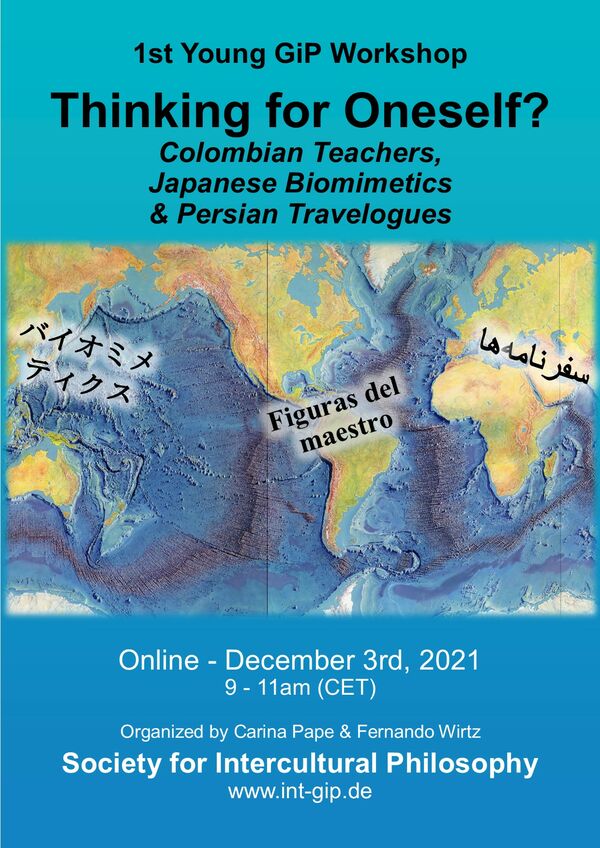Thinking for Oneself?
1st Young GIP Workshop
Colombian Teachers, Japanese Biomimetics & Persian Travelogues
Online - December 3rd, 2021 9 - 11am (CET)
Organized by Carina Pape & Fernando Wirtz
Register at: events((at))int-gip.de
Christian Sinn
School teachers are mainly executors who depend on theoretical results. They do not have time nor the will for proper theory production, and their main task is the imposition of knowledge.
These are common suppositions about teachers not only by society but also by academics. Opposed to this external attribution, the investigations of the Grupo de la Historia de la Práctica Pedagogica have shown a variety of differing self-attributions. During the 70s’, teachers and educational workers uncovered a different intellectual and political self-attribution, as empowered active constructors of social and political life. By framing this different teacher role as an activist of life (militante de la vida), Contreras & Murcia have analysed the political interpretation of Colombian teachers in the social movement. Colombian teachers fought for political and social recognition of their knowledge and expertise, mainly incarnated in a right to theorise themselves and to co-decide on educational politics. In the workshop I will present two fundamental approaches I have found on Colombian teacher roles in relation to Claudia Brunner’s concept of undoing epistemic violence.
Alessio Gerola
Beyond control: philosophical and ethical implications of biomimicry
Biomimicry is a contemporary design approach that takes nature as source of inspiration for technological innovation. Besides biomimicry, other bio-inspired approaches exist, such as biomimetics and bionics. Their interests and scope lean closer to those of engineering than to those of ecology. This situation creates a fundamental ambiguity within bio-inspired approaches. While biomimicry aims at more sustainable and bio-inclusive design, biomimetics and bionics seem to imply a more subtle form of exploitation of nature. In the context of the Anthropocene, such ambiguity raises questions about the possible forms of our planetary futures. If nature is supposed to inspire not only our technologies but also our ecological ethos, what kind of relationship with nature can we imagine in order to shape a more sustainable future? I will briefly explore potential directions in which Japanese philosophers such as Nishida Kitarō can help us addressing this question.
Sakine Mohamadi Bozorg
A Historical Investigation into the “Emersion” or “Problematization” of Critical Thinking in Iranian Modernity
The discussion of modernity in Iran and its various dimensions has been a significant issue in recent Iranian academic and intellectual debates. The variety of research questions and approaches stemming from these debates address subject areas such as political modernity, social modernity, modernization, and the discussion of development. They have also produced plentiful attempts to provide different readings of historiography and the definition of modernity. However, most of these studies are based on Occidental modern philosophy, with Iranian scholars attempting to formulate Iranian modernity based on the ideas of Foucault, Habermas, Giddens, and others. My project investigates theoretical dimensions and philosophical concepts in modern Iranian thought. For this purpose, I will question of the concept of critique and the characteristics of critical thinking. I focus on a specific contemporary Persian literary genre, namely Persian travelogues.
To participate, please send an email to events((AT))int-gip.de (subject: „Young GiP“). You will then receive the link for participation via BigBlueButton.
